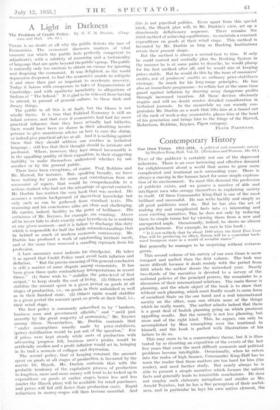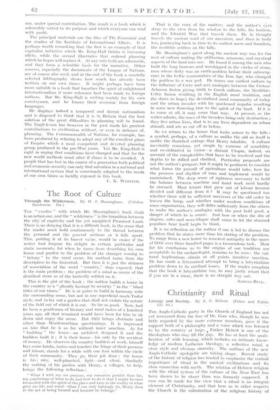Contemporary History
THAT of the publicist is certainly not one of the depressed
industries. There is an ever increasing and effective demand for enlightenment about a world that seems to grow nidre complicated and irrational each succeeding year. There is always a craving in the human heart for some simple explana- tion of its environment. To meet this demand the profession of publicist exists, and we possess a number of able and intelligent men who occupy themselves in explaining society to itself. Of these Commander King-Hall is one of the most brilliant and successful. He can write lucidly and simply as all good publicists must do. But he has also the art of making dry and complicated facts into sin interesting and even exciting narrative. This he does not only by reducing them to simple terms but by viewing them from a new and unexpected angle. Occasionally, indeed, he shows an almost puckish huinour. For example, he says in this book :
" It is not unlikely that by about 1940 when the third Five-Year Plan will be producing its effect, Russia will be a fAmewhat back- ward bourgeois state in a world of socialist states."
But generally he manages to be surprising without. extrava- ganza.
' This second volume of his survey of our own times is more compact and unified than the first volume. The task was more difficult because it deals mainly with the period from 1081 which the author deems the watershed year. Nearly two-thirds of the narrative is devoted to a survey of the national policies of the principal powers, the remainder to a discussion of their international relations. The main theme is planning, and the whole object of the book is to show that without such planning, which must finally result in some form of socialised State on the one hand and a real international society on the other, man can obtain none of the things which he really wants. The author admits indeed that there is a great deal of foolish planning going on which produces appalling results. But the remedy is not less planning, but more and of the right kind. This, he argues, can only be accomplished by Man triumphing over the irrational in himself, and the book is . packed with illustrations of his failure to do so.
This may seem to be a commonplace theme, but it is illus- trated by so diverting an exposition of the events of the last five years that even the most difficult economic and political problems become intelligible.. Occasionally, when he enters into the realm of high finance, Commander King-Hall has to warn the reader that these matters are too hard for him (the reader), and need further study. But nearly always he is able to present a simple narrative which focuses the salient facts and generally leads to irresistible conclusions. He does not employ such elaborate metaphors and similes as Mr. Arnold Toynbee, but he has a fine perception of their useful- ness, and in particular he lays his own native clement, the sea, under special contribution. The result is a bOok which is admirably suited to its purPose and which everyone can read with profit.
The principal materials are the files of The Economist and the studies of the Institute of International Affairs. It is perhaps worth remarking that the first is an example of that capitalist initiative which Mr. King-Hall thinks is becoming effete, while the second illustrates that ordered planning which he hopes will replace it. 'At any rate both are admirable, and they form a scientific basis for the narrative. Other sources, especially the documents of the League of Nations, are of course also used, and at the end of the book a carefully selected bibliography shows how inneh has already been written on our own times. It might perhaps have been more suitable in a book that breathes the spirit of enlightened internationalism if more 'reference had been made to foreign authors. But Mr. King-Hall is writing mainly for his own countrymen, and he knows their aversion from foreign languages.
He displays indeed a tempered and decent nationalism and is dispOsed to think that it is in Britain that the best aoltition of the great difficulties in planning will be found. The Ength finnan has however in the past made his greatest contributions to civilization without, or even in defiance of, planning. The Commonwealth of Nations, for example, has been produced by refusing to adopt any of the excellent plans of Empire which a most competent and devoted planning group produced in the pre-War years. Yet Mr. King-Hall is right in urging that conditions have changed and that for the new world methods must alter if chaos is to be avoided. A people that has lost in the course of a generation both political and economic security can only find salvation in a national and international system that is consciously adapted to the needs of our own times so lucidly exposed in this book.
C. K. WEBSTER.











































 Previous page
Previous page